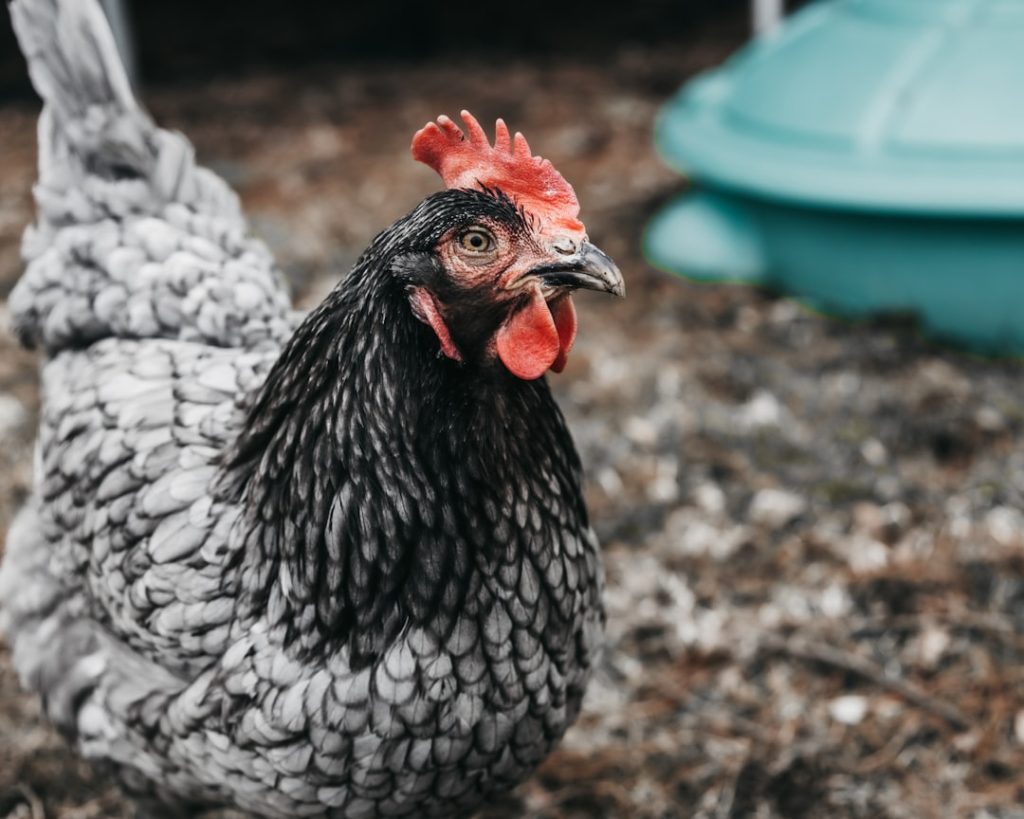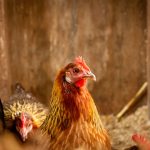Proper nutrition is essential for the health and well-being of backyard chickens. A balanced diet is crucial for ensuring that chickens receive the necessary nutrients to support their overall health, egg production, and immune function. A good quality commercial feed formulated specifically for chickens is a great foundation for their diet.
This feed should contain a balance of protein, carbohydrates, fats, vitamins, and minerals. In addition to commercial feed, chickens can also benefit from supplemental treats such as fruits, vegetables, and grains. It’s important to ensure that these treats are given in moderation and do not make up more than 10% of the chicken’s diet.
In addition to providing a balanced diet, it’s important to ensure that chickens have access to clean and fresh water at all times. Water is essential for digestion, temperature regulation, and overall health. Chickens can consume a significant amount of water, especially during hot weather or when laying eggs.
It’s important to regularly check waterers to ensure they are clean and free of debris. In addition to a balanced diet and access to fresh water, it’s important to provide chickens with access to grit. Grit consists of small, insoluble particles such as sand or small stones that chickens use to grind their food in their gizzards.
This aids in digestion and ensures that chickens are able to properly utilize the nutrients in their feed. Proper nutrition is the foundation of good health for backyard chickens. A balanced diet, access to fresh water, and supplemental grit are all essential components of a healthy diet for chickens.
By providing these essentials, chicken owners can help ensure that their flock remains healthy and productive.
Table of Contents
- 1 Maintaining a Clean Coop and Yard
- 2 Regular Veterinary Check-ups and Vaccinations
- 3 Providing Adequate Space and Shelter
- 4 Monitoring for Signs of Illness
- 5 Implementing Biosecurity Measures
- 6 Ensuring Proper Hydration and Access to Fresh Water
- 7 FAQs
- 7.1 What are some common health issues that backyard chickens may face?
- 7.2 How can I prevent health issues in my backyard chickens?
- 7.3 What should I include in my backyard chickens’ diet to keep them healthy?
- 7.4 How can I maintain a clean environment for my backyard chickens?
- 7.5 What are some signs that indicate my backyard chickens may be unwell?
Key Takeaways
- Proper nutrition is essential for backyard chickens to maintain good health and egg production.
- Regularly clean the coop and yard to prevent the spread of diseases and parasites.
- Schedule regular veterinary check-ups and vaccinations to keep chickens healthy and disease-free.
- Provide adequate space and shelter to ensure the well-being and comfort of the chickens.
- Monitor for signs of illness such as changes in behavior, appetite, or egg production.
- Implement biosecurity measures to prevent the introduction and spread of diseases in the flock.
- Ensure proper hydration and access to fresh water at all times to keep chickens healthy and hydrated.
Maintaining a Clean Coop and Yard
Regular Cleaning of the Coop
Regular cleaning of the coop is essential to remove droppings, old bedding, and any spilled feed. This helps to reduce the build-up of harmful bacteria and parasites that can thrive in dirty environments.
Providing Adequate Ventilation and Yard Maintenance
In addition to regular cleaning, it’s important to provide adequate ventilation in the coop to help reduce moisture and ammonia levels. Additionally, it’s crucial to keep the surrounding yard area clean and free of debris. This includes regularly removing any accumulated droppings from the yard and ensuring that there are no areas of standing water that can attract pests or breed bacteria.
Benefits of a Clean Coop and Yard
By maintaining a clean coop and yard, chicken owners can help ensure that their flock remains healthy and free from disease. Providing a clean yard area also helps to reduce the risk of parasites such as mites and lice, which can thrive in dirty environments. By taking these steps, chicken owners can help ensure that their flock remains healthy and productive.
Regular Veterinary Check-ups and Vaccinations

Regular veterinary check-ups and vaccinations are important for maintaining the health and well-being of backyard chickens. Just like any other pet or livestock animal, chickens can benefit from regular veterinary care to monitor their overall health and address any potential issues before they become serious problems. A veterinarian with experience in poultry care can provide valuable guidance on nutrition, parasite control, and disease prevention.
In addition to regular check-ups, vaccinations can also play a crucial role in protecting chickens from common diseases such as Marek’s disease, Newcastle disease, and infectious bronchitis. In addition to regular veterinary care, it’s important for chicken owners to be vigilant in monitoring their flock for any signs of illness or injury. Early detection of health issues can help prevent the spread of disease and improve the chances of successful treatment.
This includes regularly checking chickens for any changes in behavior, appetite, or appearance, as well as monitoring egg production and quality. By staying proactive in monitoring their flock’s health, chicken owners can help ensure that any potential issues are addressed promptly. Regular veterinary check-ups and vaccinations are important components of maintaining the health and well-being of backyard chickens.
By seeking regular veterinary care and staying vigilant in monitoring their flock for signs of illness or injury, chicken owners can help ensure that their flock remains healthy and productive.
Providing Adequate Space and Shelter
Providing adequate space and shelter is essential for the health and well-being of backyard chickens. Chickens need enough space to move around freely, stretch their wings, and engage in natural behaviors such as scratching and dust bathing. Overcrowding can lead to stress, aggression, and an increased risk of disease transmission.
As a general rule of thumb, it’s recommended to provide at least 2-3 square feet of space per chicken inside the coop, and at least 8-10 square feet per chicken in an outdoor run. In addition to providing adequate space, it’s important to ensure that chickens have access to shelter from the elements. This includes protection from extreme temperatures, wind, rain, and predators.
The coop should be well-ventilated to prevent moisture build-up and provide adequate insulation to maintain a comfortable temperature year-round. Outdoor runs should also be covered with wire mesh or netting to protect chickens from aerial predators such as hawks or owls. By providing adequate space and shelter, chicken owners can help ensure that their flock remains healthy and comfortable.
Providing adequate space and shelter is essential for the health and well-being of backyard chickens. By ensuring that chickens have enough space to move around freely and access to shelter from the elements, chicken owners can help ensure that their flock remains healthy and productive.
Monitoring for Signs of Illness
Monitoring for signs of illness is an important part of maintaining the health and well-being of backyard chickens. Chickens can be susceptible to a variety of diseases and health issues, so it’s important for chicken owners to be vigilant in monitoring their flock for any signs of illness or injury. This includes regularly checking chickens for changes in behavior, appetite, or appearance, as well as monitoring egg production and quality.
Common signs of illness in chickens can include lethargy, decreased appetite, abnormal droppings, respiratory issues, or changes in comb color. In addition to monitoring individual chickens for signs of illness, it’s also important to observe the flock as a whole for any unusual behavior or patterns. For example, an increase in mortality or a sudden drop in egg production can be indicators of an underlying health issue within the flock.
By staying proactive in monitoring their flock for signs of illness or injury, chicken owners can help ensure that any potential issues are addressed promptly. Monitoring for signs of illness is an important part of maintaining the health and well-being of backyard chickens. By staying vigilant in monitoring their flock for any signs of illness or injury, chicken owners can help ensure that their flock remains healthy and productive.
Implementing Biosecurity Measures

Practices to Reduce Disease Risk
This includes measures such as limiting visitor access to the coop and yard area, quarantining new birds before introducing them to the flock, and regularly disinfecting equipment and footwear.
Preventing Disease Transmission from Outside Sources
In addition to implementing biosecurity measures within the coop and yard area, it’s also important for chicken owners to be mindful of potential sources of disease transmission from outside sources such as wild birds or rodents. This includes keeping feed stored in secure containers to prevent contamination from pests, as well as regularly cleaning up spilled feed or water to reduce the risk of attracting unwanted visitors.
Ensuring a Healthy and Productive Flock
By implementing biosecurity measures both within the coop and yard area as well as from outside sources, chicken owners can help reduce the risk of disease transmission within their flock. By being proactive in implementing biosecurity measures, chicken owners can help ensure that their flock remains healthy and productive.
Ensuring Proper Hydration and Access to Fresh Water
Ensuring proper hydration and access to fresh water is essential for maintaining the health and well-being of backyard chickens. Water is essential for digestion, temperature regulation, and overall health. Chickens can consume a surprising amount of water, especially during hot weather or when laying eggs.
It’s important to regularly check waterers to ensure they are clean and free of debris. In addition to providing access to fresh water, it’s also important to ensure that waterers are placed at a height that is easily accessible to all chickens within the flock. In addition to ensuring proper hydration through access to fresh water, it’s also important to be mindful of potential sources of contamination within the water supply.
This includes regularly cleaning waterers to prevent algae growth or bacterial contamination, as well as ensuring that water sources are protected from potential sources of contamination such as wild birds or rodents. By ensuring proper hydration through access to clean and fresh water, chicken owners can help ensure that their flock remains healthy and productive. Ensuring proper hydration through access to clean and fresh water is essential for maintaining the health and well-being of backyard chickens.
By regularly checking waterers for cleanliness and accessibility, as well as being mindful of potential sources of contamination within the water supply, chicken owners can help ensure that their flock remains healthy and productive. In conclusion, maintaining the health and well-being of backyard chickens requires a combination of proper nutrition, regular veterinary care, biosecurity measures, access to clean water, adequate space and shelter, monitoring for signs of illness, and maintaining a clean living environment. By being proactive in addressing these key areas of care, chicken owners can help ensure that their flock remains healthy, productive, and happy.
Proper nutrition provides essential nutrients for overall health; maintaining a clean coop and yard reduces the risk of disease; regular veterinary check-ups monitor overall health; providing adequate space and shelter ensures comfort; monitoring for signs of illness allows for early intervention; implementing biosecurity measures reduces disease transmission; ensuring proper hydration through access to fresh water supports overall health. By prioritizing these aspects of care, chicken owners can help ensure that their flock remains healthy and productive for years to come.
If you’re looking for tips on how to keep your backyard chickens healthy, you might also be interested in learning about how to turn a shed into a chicken coop. This article from Poultry Wizard provides valuable information on converting a shed into a suitable living space for your feathered friends. Check it out here.
FAQs
What are some common health issues that backyard chickens may face?
Some common health issues that backyard chickens may face include respiratory infections, parasites (such as mites and lice), egg binding, and nutritional deficiencies.
How can I prevent health issues in my backyard chickens?
To prevent health issues in backyard chickens, it is important to provide a clean and well-maintained coop, offer a balanced diet, practice good biosecurity measures, and regularly monitor the health of the chickens.
What should I include in my backyard chickens’ diet to keep them healthy?
A healthy diet for backyard chickens should include a balanced commercial feed, fresh water, and access to grit and oyster shell for calcium. Additionally, offering occasional treats such as fruits and vegetables can provide added nutrition.
How can I maintain a clean environment for my backyard chickens?
To maintain a clean environment for backyard chickens, regularly clean the coop, provide proper ventilation, and regularly remove soiled bedding. Additionally, practicing good biosecurity measures can help prevent the spread of diseases.
What are some signs that indicate my backyard chickens may be unwell?
Signs that indicate backyard chickens may be unwell include decreased egg production, changes in behavior, abnormal droppings, respiratory symptoms, and visible signs of injury or illness. It is important to monitor the chickens regularly for any signs of illness.
Meet Walter, the feathered-friend fanatic of Florida! Nestled in the sunshine state, Walter struts through life with his feathered companions, clucking his way to happiness. With a coop that’s fancier than a five-star hotel, he’s the Don Juan of the chicken world. When he’s not teaching his hens to do the cha-cha, you’ll find him in a heated debate with his prized rooster, Sir Clucks-a-Lot. Walter’s poultry passion is no yolk; he’s the sunny-side-up guy you never knew you needed in your flock of friends!







